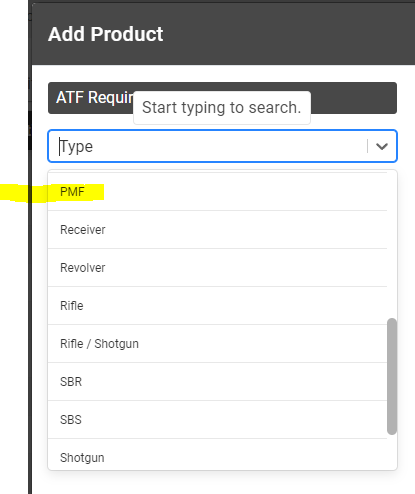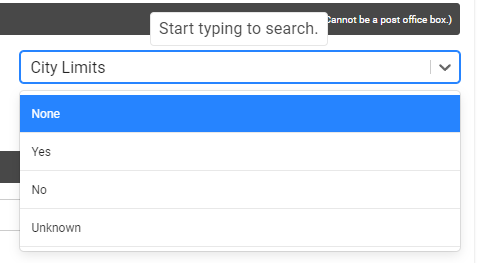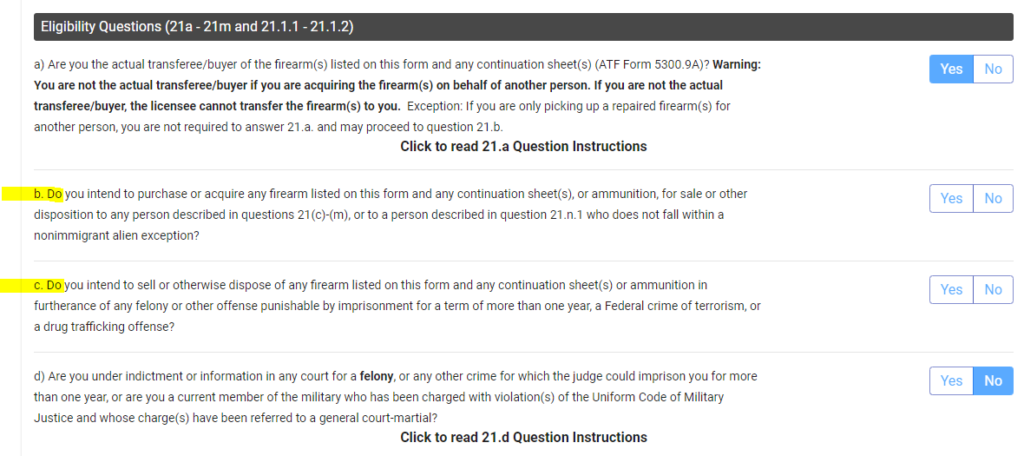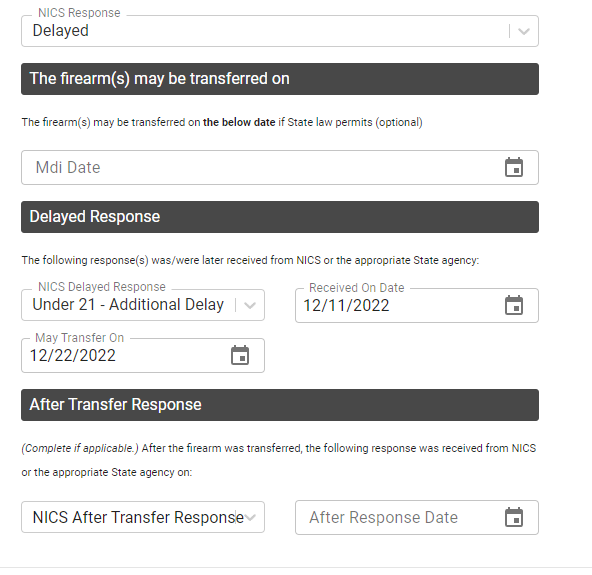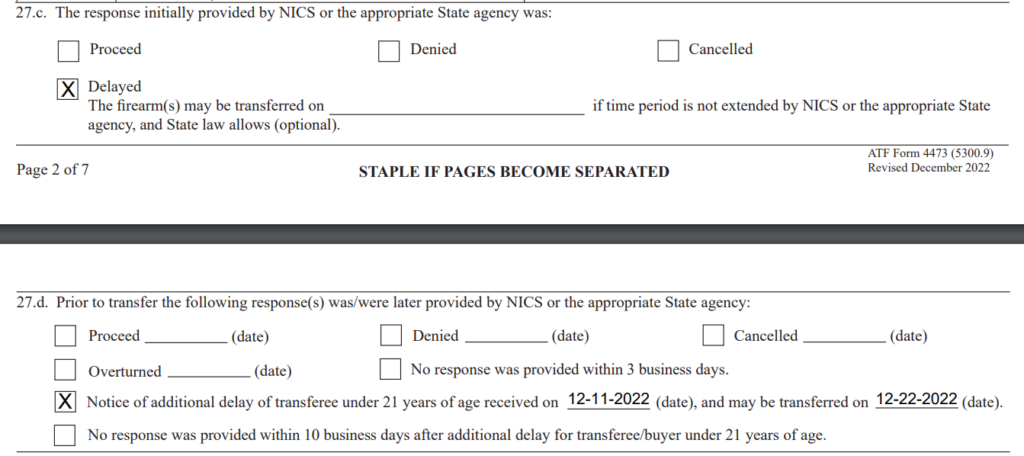The ATF recently revised and released a new Form 4473, you can read their announcement here. The ATF is encouraging all FFLs to use the new form immediately even before they have published it to the Federal Register for notice and comment and review. As such, we have already integrated the new ATF Form 4473 (December 2022) into FFL Boss. Due to the ATF Final Rule 2021R-05, the NICS Denial Notification Act and the Bipartisan Safer Community Act there are a good number changes to the 4473 and to the FFL Boss process. We will detail all the changes on the 4473 and to the FFL Boss process below.
Privately Made Firearms (PMF)
Item 1, Section A. It now reads: “Manufacturer and Importer, if any or Privately made firearm (PMF) (If the manufacturer and importer are both different, include both)”. Any firearm, received by a FFL, that was privately made (not manufactured by another licensee) must now be recorded on the ATF Form 4473 as “Privately Made Firearm (PMF)”.
We have added the PMF type class to the acquisition process for compliance with ATF Final Rule 2021R-05 and the new ATF Form 4473 (December 2022):
Reside in City Limits?
The ATF has added a new question 10 to the December 2022 Revised ATF Form 4473. The transferee/buyer is now asked to answer whether they “Reside in City Limits?” regarding their residence address.
For example, if a transferee lists their residence city as Phoenix but they actually reside outside of the legal city limits, they will answer “No” to this item, thankfully the ATF added an “Unknown” selection as we’re sure all FFLs would receive many requests to map buyer’s addresses not knowing if they reside with the legal city limits. We have added the “Reside in City Limits?” question to the Kiosk Mode at the end of the address collection line:
Two new prohibiting questions added to Section B
21b: “Do you intend to purchase or acquire any firearm listed on this form and any continuation sheet(s) or ammunition, for sale of other disposition to any person described in questions 21(c)-(m) or to a person described in question 21.n.1 who does not fall within a nonimmigrant exception?”
21.c.: “Do you intend to sell or otherwise dispose of any firearm listed on this form and any continuation sheet(s) or ammunition in furtherance of any felony or other offense punishable by imprisonment for a term of more than one year, a Federal crime of terrorism, or a drug trafficking offense?”
We have added both new questions to the Kiosk Mode in the order they are placed on the new 4473. Oddly enough, unlike every other prohibiting question on the previous and current ATF Form 4473 there are no instructions within the 4473 instructions for 21b and 21c, so neither has a link in the FFL Boss Kiosk Mode to instructions for the two new questions:
Bipartisan Safer Community Act 10-day waiting period for transferees under the age of 21
To comply with the Bipartisan Safer Community Act 10-day waiting period on certain transfers involving transferees under the age of 21, Section C of the Form has been revised as follows:
- Prior to the NICS/POC information, an instructional header has been added stating: “Notice: If transferee/buyer is under 21, a waiting period of up to 10 days may apply where notification from NICS is received within 3 business days to further investigate a possible disqualifying juvenile record. A NICS check is only valid for 30 calendar days from the date recorded in question 27a.”
- Item 27.c. was amended to show the date an FFL may transfer a firearm should NICS or the State agency (conducting the background check) not reply stating more time is needed for the check. It now reads next to the delayed check box: “The firearm(s) may be transferred on ____ if time period is not extended by NICS or the appropriate State agency, and State law allows (optional).”
- A box has been added to 27.d. should NICS or the appropriate State agency delay the check as more time is needed to conduct it on a transferee under 21 years of age. It now reads: “Notice of additional delay of transferee under 21 years of age received on _______ (date), and may be transferred on _________ (date).”
- Also added to 27.d. is a box for FFLs to check should no response be received from NICS or the appropriate State agency (for transferees under 21 years of age) within 10 business days after the initial delay was given. It now reads: “No response was provided within 10 business days after initial delay for transferee/buyer under 21.”
We have added all three new Bipartisan Safer Community Act 10-day waiting period responses to the Disposition page after you generate a 4473:
Which will automatically fill out the new ATF Form 4473 (December 2022) questions 27c and 27d once a new 4473 is generated:
FFL Boss provides ATF compliance at an affordable price
FFL Boss is the first FFL Software Provider to launch the new ATF Form 4473 (December 2022) online within an FFL software platform. We can be your FFL software provider if you want ATF compliance made easy through software automation. We have the most up to date ATF Form 4473 and Electronic A&D Bound Book as well as many automation features that automatically complete compliance forms and processes while you check a client out using our Kiosk Mode. See all features FFL Boss offers and sign up for a 7 day free trial at www.fflboss.com.
What is the ATF Form 4473?
The ATF Form 4473 is a form required by the Bureau of Alcohol, Tobacco, Firearms, and Explosives (ATF) for individuals purchasing firearms from federally licensed firearms dealers. This form is used to conduct background checks on individuals to ensure that they are legally allowed to purchase firearms.
The Form 4473 contains information about the buyer, such as their name, address, date of birth, and government-issued identification number. It also asks questions about the buyer’s criminal history, mental health, and other factors that may disqualify them from owning a firearm. For example, the form asks whether the buyer has been convicted of a crime punishable by imprisonment for more than one year, whether they are a fugitive from justice, and whether they are an unlawful user of controlled substances.
Once the form is completed, the firearms dealer will call in the information to the National Instant Criminal Background Check System (NICS), which is run by the FBI. The NICS will then check the information against its database to determine whether the buyer is eligible to purchase a firearm. If the buyer passes the background check, they will be able to complete the purchase. However, if they do not pass, the purchase will be denied.
The Form 4473 is an important tool in the effort to prevent firearms from falling into the hands of individuals who should not have them. By requiring background checks for all firearm purchases, the ATF is able to keep guns out of the hands of dangerous individuals and help ensure the safety of the American public.

